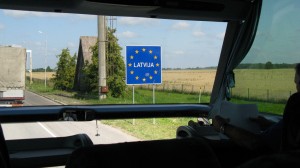
The Latvian government warns that until June 1 traffic backups at the Estonian-Latvian and Lithuanian-Latvian borders should be expected. Photo by Spiros Kakouris/CC
VILNIUS — After removing restrictions on their borders upon joining the Schengen Area in 2007, both Latvia and Lithuania are tightening border control for security reasons.
The two countries vacated their border control posts in December 2007 and joined the internally borderless Schengen zone stretching from Finland to Portugal. Since then they have continued to perform random checks on their EU borders, though, to help prevent smuggling and other criminal activity.
Latvia resumed checking passports Monday in anticipation of the NATO Parliamentary Assembly, which will happen in Riga from May 28 until June 1. The session will bring together around 300 parliamentarians from the 28 NATO member countries from North America and Europe as well as delegates from partner countries and observers to discuss international security concerns.
Passport checks on border crossings will proceed as they did before the country joined the Schengen zone.
Latvian interior ministry press representative Mareks Matisons said the restoration of border control is necessary for security reasons in the build up to the spring session of the NATO Parliamentary Assembly.
The Latvian borders to Estonia, Lithuania as well as its ports and airports will be under the required checks until 10 a.m. on June 1 on government instruction.
Travelers will need their passports and any documents relevant to their vehicle. The State Border Guard requests that the public refrain from unnecessary travel through border points during the period to keep traffic from piling up.
Money matters
Lithuania is also looking to tighten its cross-Schengen border control as people carrying €10,000 or more in cash will now have to declare their funds to customs.
The Ministry of Interior proposed the measure, saying the new rule will help curb money laundering between Lithuania and other EU countries.
The bill being drafted by the Financial Crimes Investigation Service will amend the Money Laundering and Terrorist Financing Prevention Act, which the government will consider Wednesday.
Cash smuggling across the border is widely used in terrorist financing schemes and the opening of the EU’s internal borders aided the practice because it is now hard to control.
“Lithuanian criminal funds moved to other states or foreign countries with criminal funds brought into Lithuania, a further financial transactions of funds of illicit origin and therefore the State is finding it increasingly difficult to trace,” the notes from the bill state.
This article is free to view. To read Baltic Reports’ subscription-only articles, click here.












